
I launched 6 startups in 8 months (and 5 of them failed)
Pandemic startup story from a founder
A story about founding several startups, funding, investor relationships, writing software and winning hackathons.
Some people like Peter Levels say ">95% of everything I ever did failed (...) ship more" while the famous Rework book provides a study-based statement that "People who failed before have the same amount of success as people who have never tried at all. (...) Already successful enterpreneurs are far more likely to succeed again". In my opinion if you fail smart, mistakes do teach you a lesson. It's all about getting feedback and learning from it. With this in mind, some of the initiatives I'm describing were not failures at all. They either made me money or taught me a lot.
This is not a story of me working hard. This is a story of how right people around you allow you to tackle hard problems. Also how challenging it is to create multiple complex products at the same time.
I long idolised Peter Levels' legendary "12 startups in 12 months" challenge. It seemed unreal that you can create thriving businesses by bootstrapping (starting a company with what you have, without seeking external funding). While being fascinated with this notion, I also wanted to approach issues way beyond my competence, budget and scale. To execute big ideas, I needed a team. Collaboration enables scale and this is exactly what we did. Some of the projects got initial funding (most of which was equity-free - without giving up shares in the company). The team consisted of 5-6 people, depending on the project.
Sure, I could also do it the "Elon Musk way" - start something utilitarian (zip2, PayPal), make a lot of money and use this money to invest in passion projects. I feel like I don't have the right motivation to go this route. Life feels too short to waste time on just making money. Even if this is the most efficient way.
I'm sure some of you won't agree with me calling these projects startups. Some of them weren't really shipped and sold. At least they were supposed to. A lesson in all of these stories is not only that you should ship more - ship faster as well. Motivation is a finite resource, especially when a group of people is involved.
Hackathons
It all started with hackathons.
I participated in hackathons way before I met people with whom I created the projects outlined in this article. Once, I invited a few of my friends to go to the event, create something cool, have a couple of beers and perhaps win some money. And that's exactly what happened. No expectations, no pressure.
After few events we had a good understanding of what hackathons are about. And how to win them. I could describe what we've learned but it is a topic broad enough for another article. One of my friends, who was leading some projects while I led the others, created a set of guidelines for our hackathon participation: "Components of hackathon success". (Yes, it sounds ridiculous.) After introducing this tongue-in-the-cheek framework, we rarely left the hackathon venue without a prize.
A funny thing about hackathons is that when you win, you get all kinds of offers. Sometimes you may get a new job and sometimes an investment or incubation offer.
An off-putting thing about these events is that they aren't exactly a healthy way to spend time. Staying up for one to two nights, mixing energy drinks with alcohol, limited access to showers and only fast food available are not really that exciting when you do it for the tenth time. Sure, we tried to bypass those limitations, booked hotels and introduced mandatory sleeping times for ourselves... But it didn't feel that fun anymore.
It was only natural to stop going to hackathons and make a next step. We've decided to try to work on something longer than for a weekend.
Startups
All of the ideas are coded:
💡[when idea came up] 🗓 [work start date] 💰[funding in $] 🛑 [date of admitting failure]
You will see a lot of polish language in the screenshots as we've often started selling in our local market.
Mediascribe
💡05.11.2019 🗓 19.02.2020 💰 15k 🛑 12.06.2020
Live TV and podcast analysis tool.
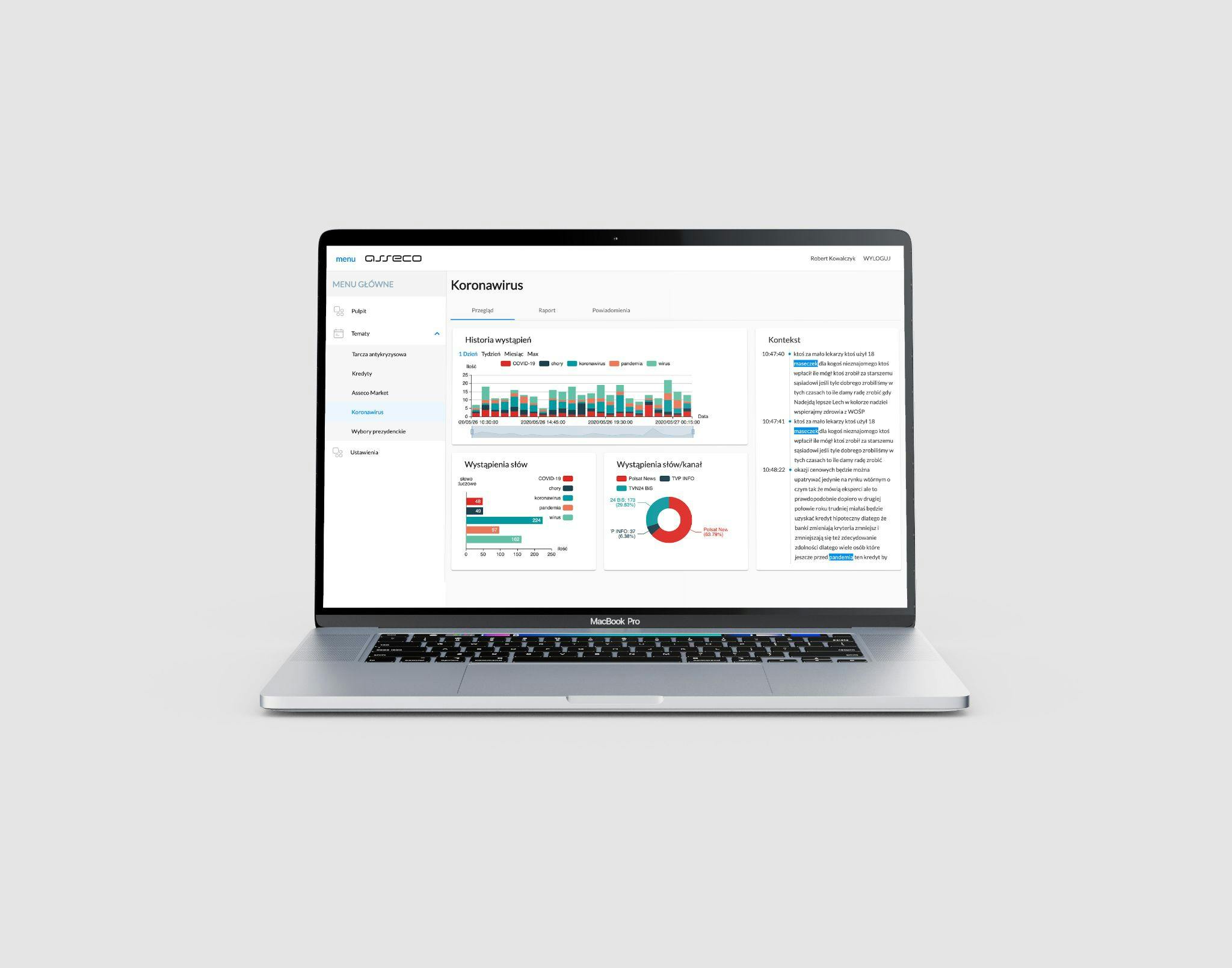
Or bank hackathon baby.
It was one of the first hackathons we took part in. The theme was focused around banks but we didn’t feel like developing another client fingerprinting tool or insurance premium algorithm. We’ve watched all the hackathon-related webinars, met before the hackathon, brainstormed and decided to go with something loosely related to banking. At the same time it was an interesting, technically challenging and exciting product.
This is how mediascribe was born. Mediascribe is an audio content analysis tool. Usual brand analysis software operates on tweets, Facebook posts, google search results or news articles. We wanted to analyse live broadcasts, podcasts, live TV and provide our clients with real time information about topics of their interest, their brand, competition ad campaigns and others.
The project was awarded a distinction and a small cash prize.
Two months after the hackathon, an organiser reached out to us with an investment offer.
We have received a small pre-seed funding (60k PLN or 15k USD).
We've worked on the product for over 3 months. We tried to go to market through investors’ sales network (they are a software house selling a mix of product and services). Unluckily, while the product was exciting to the audience we pitched it to, decision makers (and us) had a hard time putting a dollar amount on benefits coming from using it. Podcast space that could benefit from such a tool wasn't all the rage. We also weren’t able to communicate our vision clearly.
However, it was a first project with a team that later created other startups I’m describing. We also learned a heap about audio analysis. It wasn’t all for nothing. Potential clients suggested another problem we could solve using transcription and content analysis. We pivoted and created Sentimatic.
“PacMan” - Pactum Manager
💡08.03.2020 🗓 08.03.2020 💰 1.2k 🛑 19.11.2020
Software for lawyers for merging original contract text and its amendments into a uniform text.
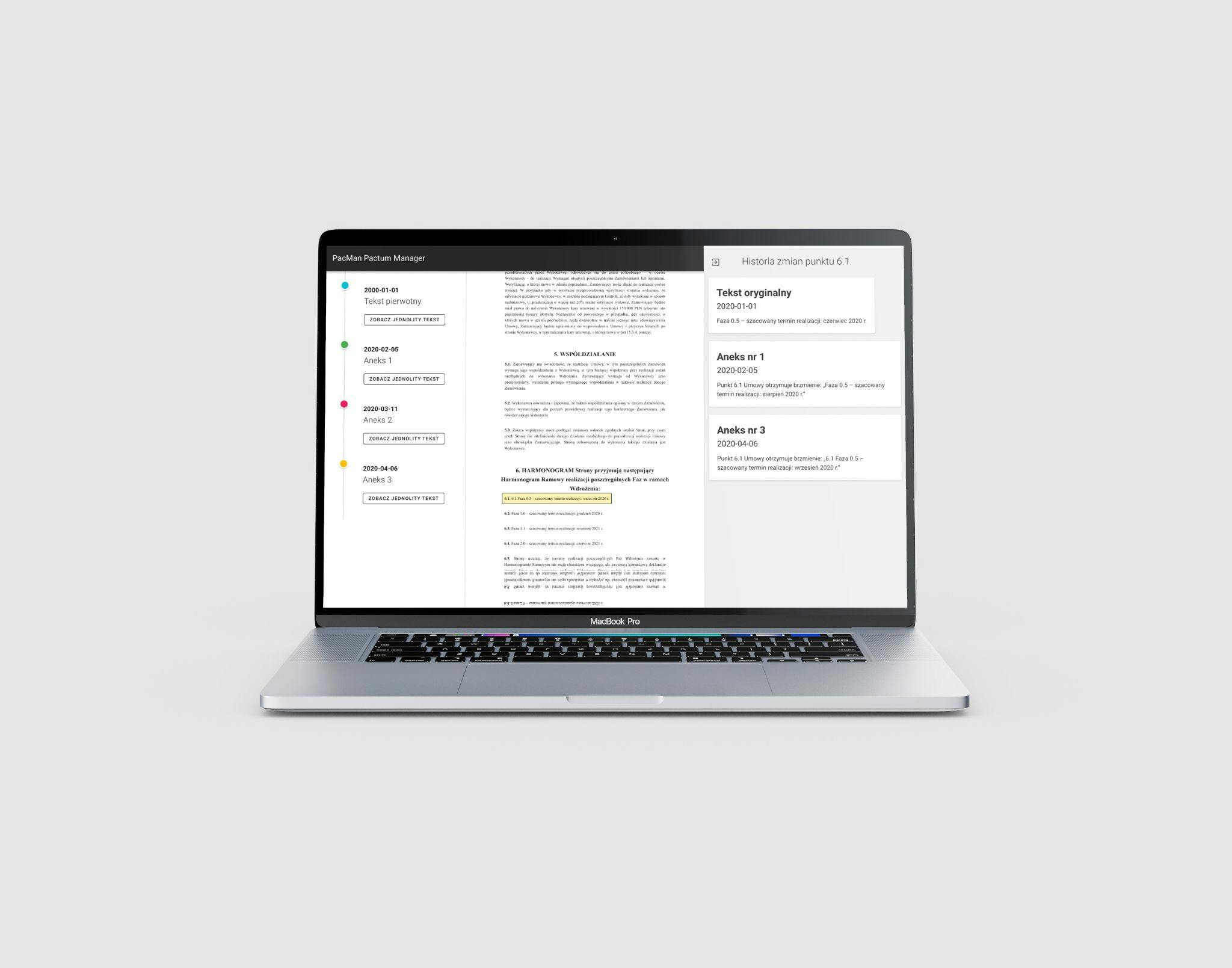
Created on a hackathon with two lawyer friends.
Bootstrapped, but way too much talking in comparison to doing.
We had a solid prototype and the idea.
We were overworked with other stuff.
No one was ready to dedicate a lot of time to it.
We were in advanced talks with a first client from Germany, legal tech licensing our tech.
We decided that we have to let it go in order to be able to execute other projects.
AI Theory
💡X 🗓 30.04.2020💰 25k 🛑 26.10.2020
Fake news detection and information spread tracking software.

Covid happened and fake news flooded the internet.
We had text analysis experience coming from previous projects.
There was a very compelling acceleration programme aimed at information quality control.
Our product worked, gained traction, people spoke about it at conferences and in the news.
We had conversations with potential clients. In the end there was no real way to monetise it.
Media+
💡02.2020 🗓 09.2020💰 25k + 100k gcloud grant 🛑 10.2021
Live TV subtitling tool for television targeted at hearing-impaired audience.
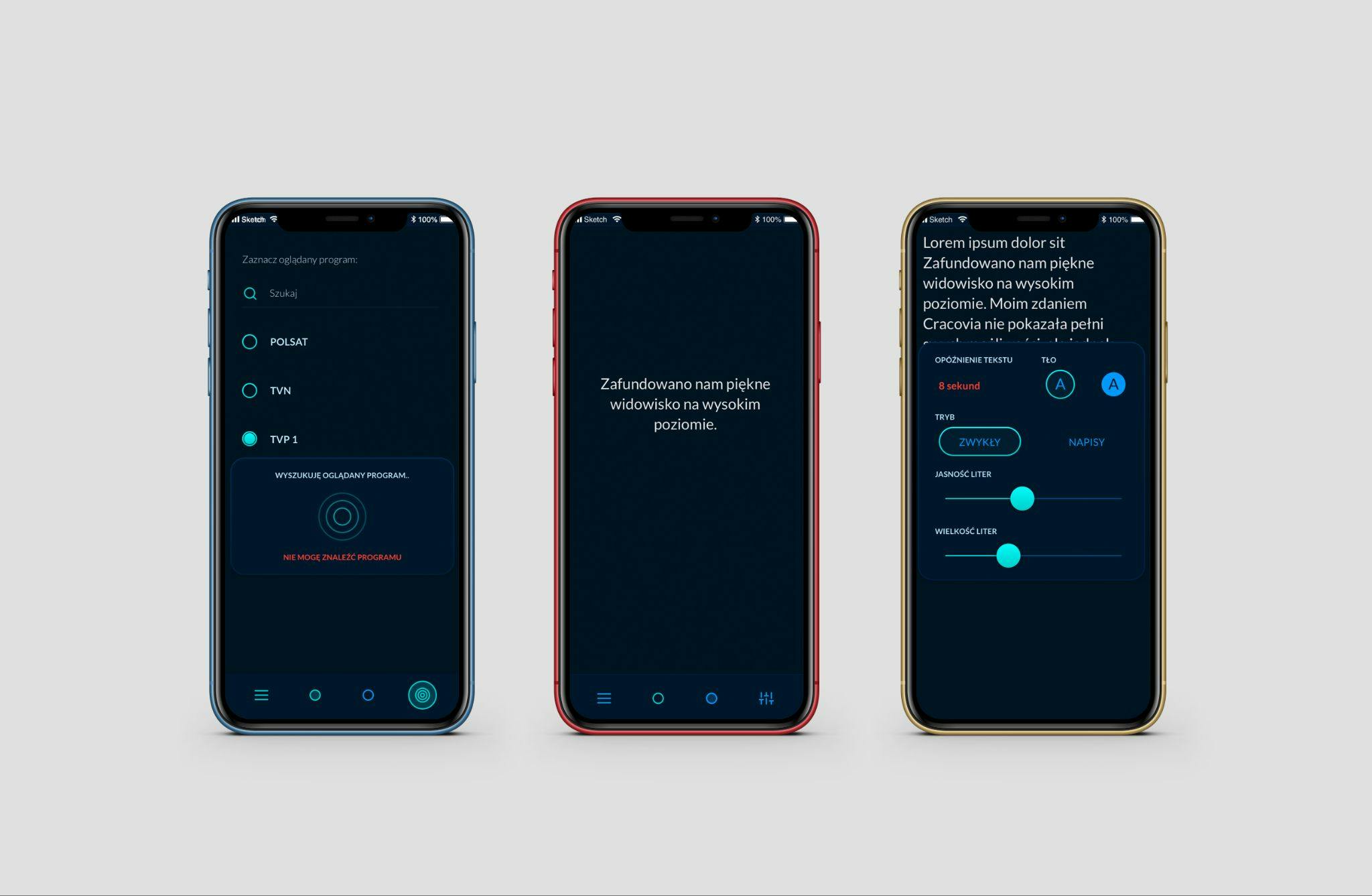
Started at a hackathon that I didn't even attend!
Oriented at accessibility.
Our main motivation was helping people.
External support included 100k PLN (25k USD) from a government incubator, 100k USD in credits from google cloud and various non-monetary benefits from NGOs and companies in form of workshops, promotion, consulting, sharing questionnaires etc.
Morale was low, especially when comparing ourselves to competition and seeing gradual improvement coming from content platforms (Youtube, etc.).
Overlap with another project, we simply had no time.
In the end, polish government ended up receiving IP rights to the software and continued the project.
In this one, we held around ten workshops with potential users. Showed them our progress, had them interact with the prototype and provide feedback.
Sentimatic
💡X 🗓 3.09.2020💰 mid 5-figure 🛑 Ongoing
AI sentiment analysis for call center.
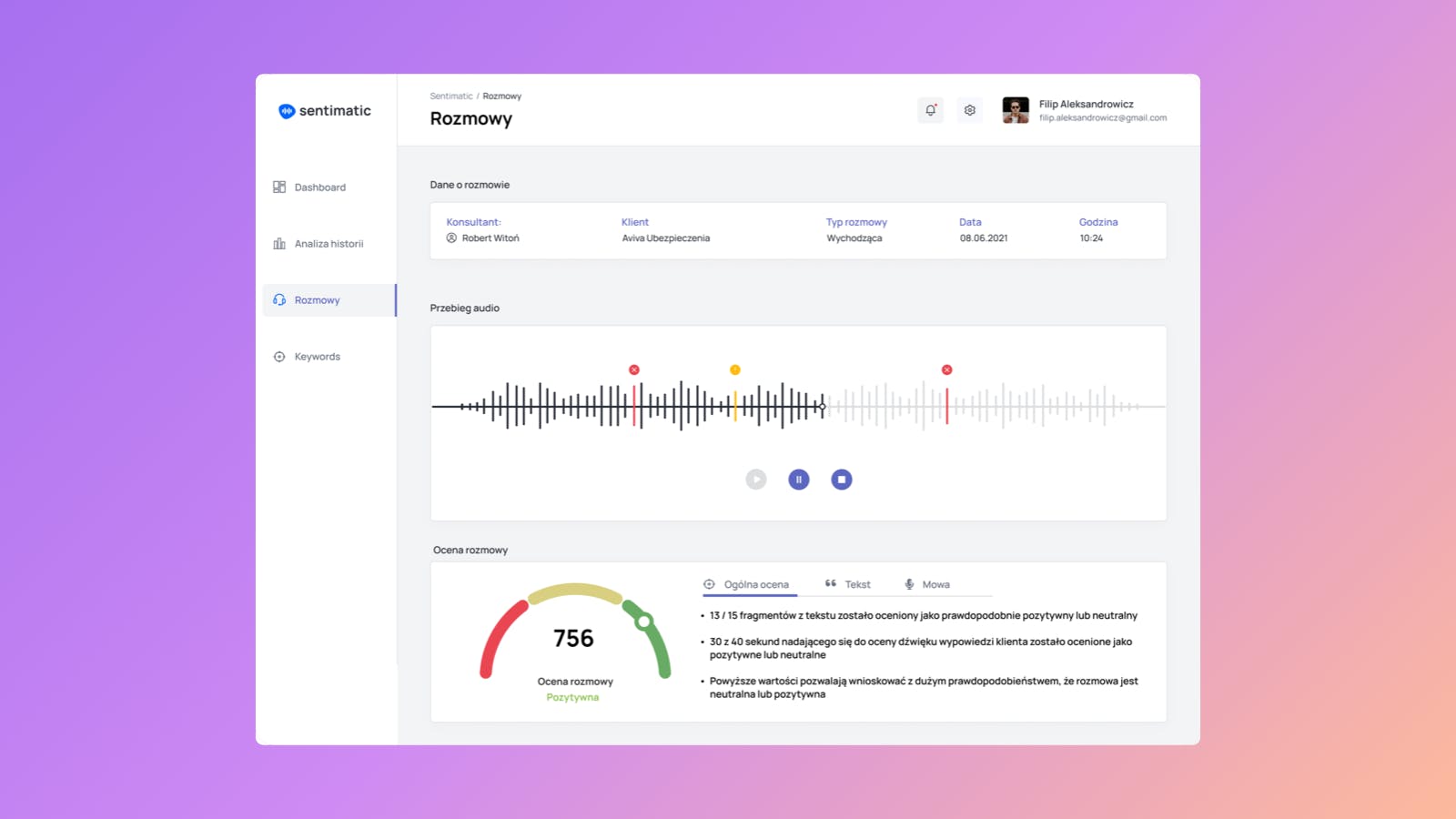
This startup is pretty much a pivot out of Mediascribe. It is built upon our experience on voice and text processing. It was started as a result of sales conversations with one of the potential clients for Mediascribe. We knew it is a deserved set of features at least for one major company.
This is by far my most successful startup. The software works and the feedback from the market is really encouraging. The deal with the investor is prohibitive of engaging other investors without explicit permission and is a limiting factor.
We are currently running multiple PoCs (Proof of Concepts) with clients and expect at least some of it to end up with yearly contracts. We are however low on cash at the moment. The team is highly motivated but this year will be crucial in determining the company's future.
Temi
💡07.09.2020 🗓 21.09.2020💰 10k + 10k (self investment) 🛑 2.06.2022
Platform connecting lawyers with clients.
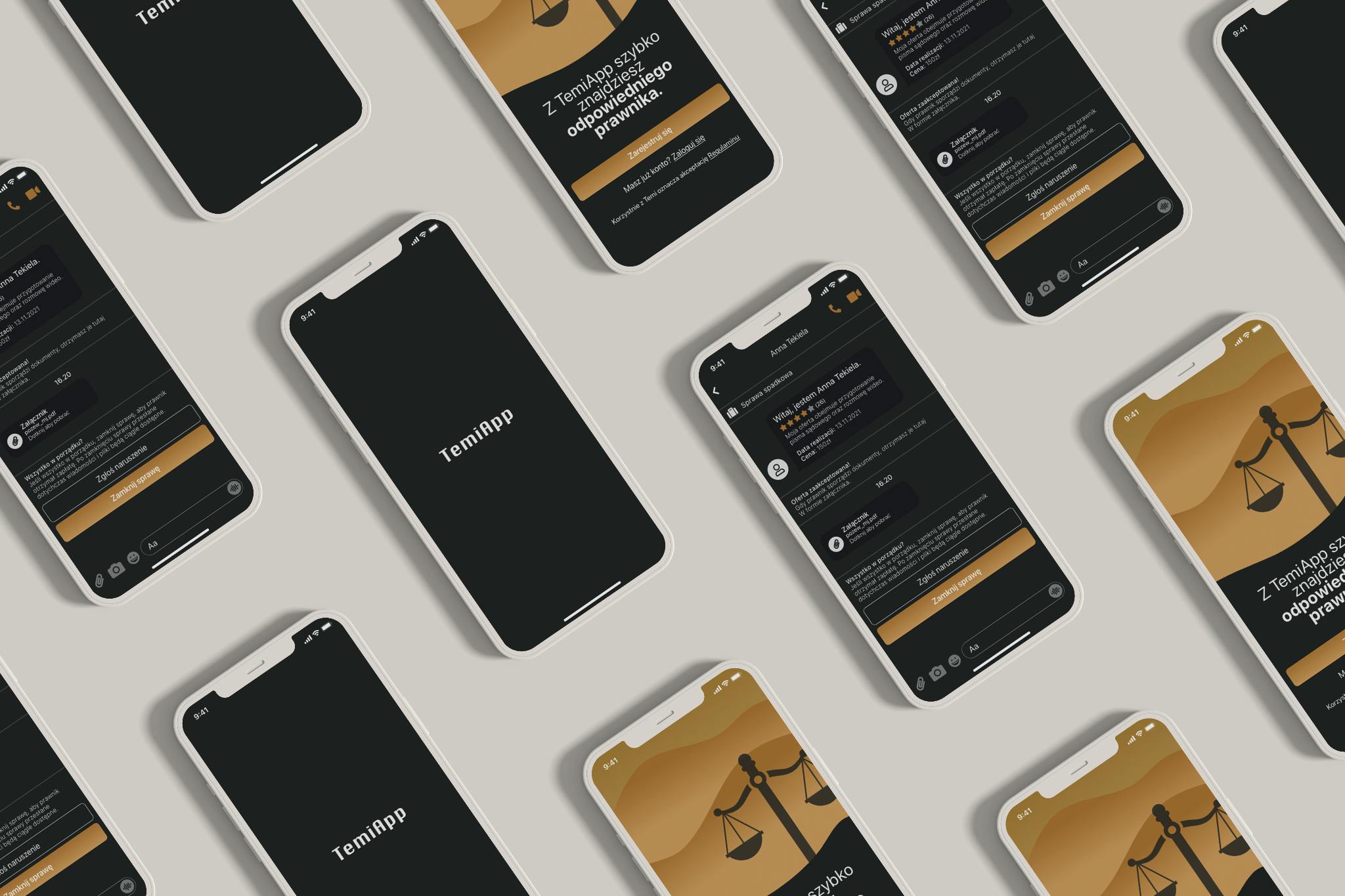
This one is interesting and died most recently. It all started with me being a guest in a startup podcast. A host knew me from startup events and invited me to a discussion about how machine learning can improve law-related processes with a legal services provider .
Later on, the host and some of his acquaintances approached me to start something in the space together. I said "yes" mostly because of their interesting backgrounds. It was the first time I was starting a business with someone more sales and management oriented. I wanted to focus only on technology and learn about sales from my partners.
This one was pretty much bootstrapped. We were a part of software incubator that helping us raise more money and providing support via business related services. They also paid for UI design and cloud hosting. We invested some of our own money into hiring a developer that helped me to code the platform.
The idea failed in the end. We've applied to a funding platform and spent way too much time trying to get the money when we should focus more on actually developing a platform. Instead of trying to start small, we wanted to have a big launch, where everything would be perfect. I wasn't able to bring it to this level on my own and we reached out for help way too late. With only one of four founders being an active developer, the rapid creation of a big platform was not feasible. We had an MVP, contacted lawyers that looked for new business and business users interested in using legal services. However, our projected operating costs were too big to kick it off without investment. That would be fine, but in terms of funding we put all of our eggs in one basket. When we realised it, it was too late to save our drive for the project.
Summary
Over the course of almost two years since the first startup on this list was founded, I gained a heap of useful skills and experience in an accelerated way.
One of the startups is still alive and I like to work on it after hours. Another "project" that I have going on is "me as a software professional" and I don't want to forgo it either.
However, it is a challenge to have a happy and healthy life while being engaged in so many initiatives. At the moment I am pursuing a full-time job as a Software Engineering Manager. I surely know that for a while I won't be starting anything new. I want to take a break, summarise my learnings and internally regroup. This article is a part of this effort. It's a retrospective and a record of these two years of grinding. I've heard lessons like "don't give up more than 20% of the company at the seed stages of funding" or "launch small as fast as you can" but these resonate stronger when you live through them yourself.
Remember when at the beginning of the article I said that I want to do things bigger than Peter Levels? At this moment, if my last startup will fail, I feel like the next thing would be something I will prototype and ship myself. I feel that this may be more sustainable for me in the long run. Running a business with multiple people is tied to many tensions and stress. I feel that not having this burden can be empowering. At this point I am able to invest a little money in the contractor help. With that being said I am a social person and collaborating with others gives me energy so I'm open to whatever future has to offer.
Have you been working on anything interesting lately? Let's talk!
